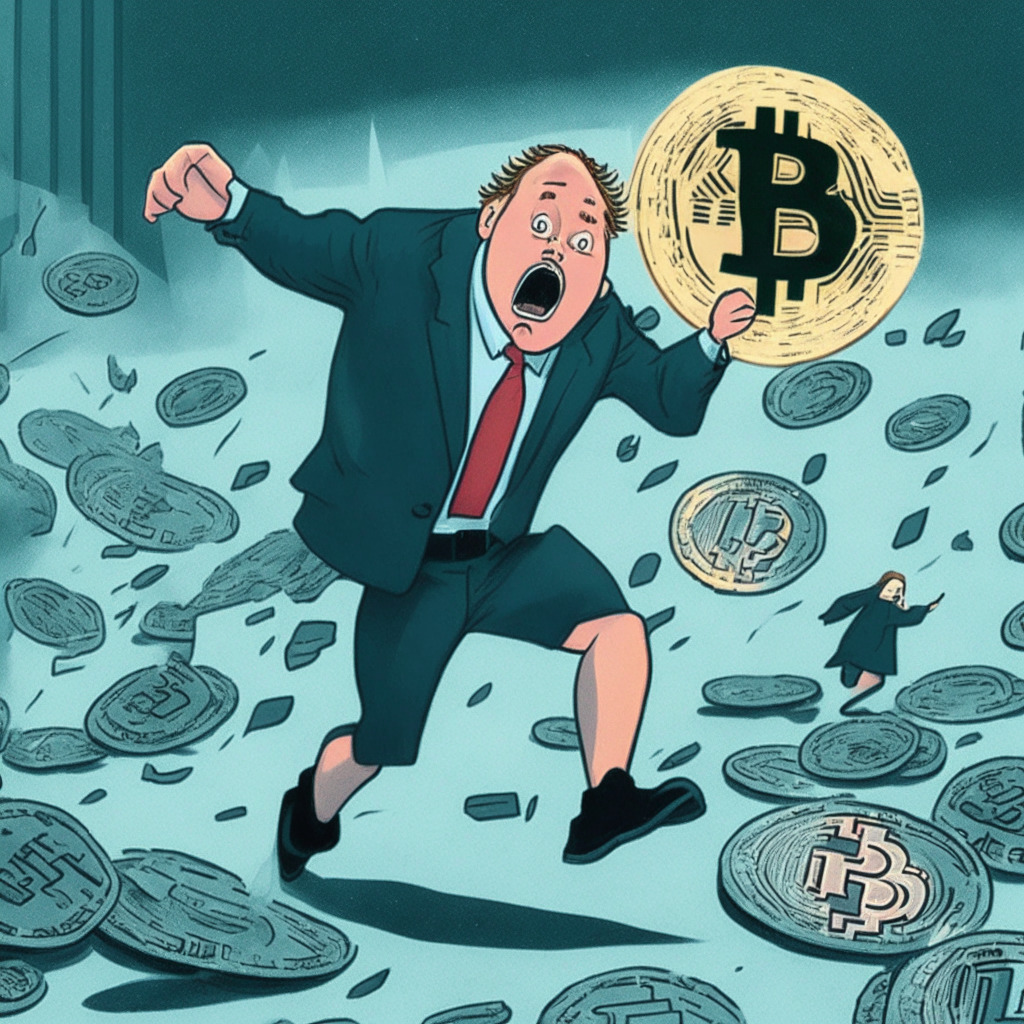IMF Managing Director, Kristalina Georgieva, highlights the growing trend of de-dollarization, increasing vulnerabilities in the U.S. banking sector, and the possible emergence of a new global currency. Crypto enthusiasts and industry professionals should closely monitor the shifting financial landscape and its potential global impacts.
Search Results for: U.S
Crypto Trading Volume Shift: Why Weekends Are Slowing Down and Weekdays Booming
Weekday trading volumes in the crypto industry have risen by 16%, while weekend trading volumes dropped by 10% due to the closure of Silvergate Exchange Network (SEN) and Signet, and changing U.S. regulations. However, weekend crypto demand remains strong, reflecting the market’s resilience.
Crypto Lending Chaos: Unraveling the Celsius Network Scandal and Lessons Learned
The now-defunct Celsius Network faces allegations of a “sham” distinction between its UK and US entities, raising concerns about their financial practices and possible fraudulent activities. This case highlights the importance of transparency, proper documentation, and adherence to regulatory guidelines in the crypto lending industry.
Coinbase Discontinues Borrow Service: Strategic Move or Regulatory Pressure?
Coinbase discontinues issuing new loans through its Borrow service, allowing US customers to use cryptocurrencies as collateral for cash loans. Amid regulatory scrutiny and market performance concerns, the move raises questions about the platform’s future offerings and the overall crypto landscape.
Economic Mega-Crisis: Kennedy Challenges Biden, Debates Cryptocurrency & Banking Collapse
Robert F. Kennedy Jr. warns of an impending economic “mega-crisis,” calling for urgent attention to rebuild the economy as job openings plummet and inflation hits the middle and working class. Kennedy criticizes President Biden’s proposed Digital Asset Mining Energy (DAME) excise tax, asserting the importance of cryptocurrencies in driving innovation and maintaining financial freedom.
Fed Rate Hike Impact on Gold, Crypto, and Oil: A Market Tug of War
The Federal Reserve’s rate hike has led to a surge in gold, silver, and crypto assets, while crude oil prices drop. The contrasting market trends raise questions about the longevity of gains in precious metals and crypto markets, as various factors, such as economic policy decisions and global geopolitical events, influence trends.
Crypto Lending’s Future: Coinbase Borrow Closure Amid Regulatory Scrutiny
The closure of Coinbase Borrow has raised eyebrows, especially amid increasing regulatory scrutiny. While some question the future of crypto lending services, it’s essential to remember that external factors unrelated to regulatory pressures could have influenced this decision. Time will tell how the industry adapts to evolving regulations.
SEC Withdraws Digital Asset Definition: Clarity Eludes Crypto Regulation
The SEC recently removed the first formal definition of “digital asset” from its latest hedge fund rule, explaining that the term is still under consideration. This comes amidst the commission’s ongoing efforts in addressing crypto regulation and integrating digital assets into existing rules. However, the lack of an official definition leaves room for debate among industry stakeholders.
Bitcoin and Ethereum Range-Bound: Analyzing the Impact of Fed Rate Hikes and Market Uncertainty
Bitcoin’s price saw minimal change after the U.S. central bank’s interest rate hike, currently trading around $28,460. Despite high inflationary pressures, Fed Chair Jerome Powell did not signal further rate hikes. Crypto investors await clarity on inflation and the impact of recent bank failures and regulatory feuding on markets, influencing BTC and ETH’s range-bound behavior.
2024 Presidential Race: RFK Jr.’s Impact on Crypto Policy and CBDC Debate
2024 presidential race candidate Robert F. Kennedy Jr. criticizes the Biden Administration’s proposal for a 30% tax on cryptocurrency mining, arguing it hinders industry growth and stifles innovation. Kennedy also accuses U.S. financial regulators of waging “an extra-legal war on crypto” and opposes Central Bank Digital Currencies as mechanisms for social surveillance and control.
Coinbase Q1 Earnings: Can International Expansion Offset Losses and Drive Growth?
Coinbase’s Q1 2023 earnings report is expected to reveal a revenue increase of 8% ($655 million) compared to the previous quarter. Despite anticipated losses, trading volumes have positively changed, and crypto enthusiasts remain optimistic about the potential impact of Coinbase’s Bermuda derivatives exchange on revenues from fees.
Bitcoin vs Interest Rates: How Fed Decisions Affect BTC’s Future & Stability in Financial Markets
Bitcoin price is yet to regain the $29,200 level and is influenced by the expectation of U.S. Federal Reserve’s interest rate increase. Analyzing excessive leverage, professional traders’ actions with BTC derivatives, futures, and options, Bitcoin might benefit from the Treasury injecting more money into the economy, regardless of the Fed’s interest rate decision.
Fed Rate Hikes: Sign of Economic Strength or Overreliance on Central Bank Control?
The U.S. Federal Reserve raised the federal funds rate to tackle inflation, leading to a rise in stock indexes, precious metals, and crypto markets. With uncertainties surrounding the U.S. debt limit and global economy, it’s vital to weigh the pros and cons of the Fed’s actions.
Stability of Bitcoin Amid Fed’s Rate Hikes: Analyzing the Conflict in Monetary Policies
The Federal Open Market Committee raised the fed funds rate by 25 basis points, moving Bitcoin’s price remained stable at around $28,600. Observers eagerly awaited indications of a pause in historic rate hikes, but recent policy statements point to potential future economic impact from tighter credit conditions, requiring further monetary policy tightening. Bitcoin continues to serve as a potential hedge against traditional market fluctuations.
Balancing Blockchain Innovation and Regulation: The Struggle for Crypto’s Future
This article discusses the challenges facing the harmonious relationship between blockchain development and regulation, highlighting two developments: a 110% growth of developers in the crypto space and the decline of American developers due to regulatory uncertainty. The stakes are high as the U.S. must balance innovation and regulation to avoid driving talent elsewhere.
Fed Interest Rate Decision Looms: Bitcoin’s Vulnerability and an Unfolding Banking Crisis
Amid the Federal Reserve’s anticipated interest rate hike and an ongoing banking crisis, Bitcoin’s price remains vulnerable and uncertain. Decreasing market volume and Bitcoin’s indifference to financial turmoil challenge investors to adapt their strategies to navigate this unclear future.
Balancing Anonymity & Compliance: Crypto’s Struggle with KYC/AML Regulations and Decentralization
The crypto sector faces the challenge of balancing anonymity and compliance with U.S. regulators demanding adherence to KYC and AML regulations. Blockchain’s future may lean towards AML/KYC compliance to attract institutional investors, while some decentralized protocols may resist due to privacy ideals. The balance between anonymity and compliance is crucial for the crypto sector’s growth and success.
Crypto Rebound Amid Federal Reserve Rate Decision: Analyzing BTC and ETH’s Future
Bitcoin rebounds from recent losses, with the market’s focus on the U.S. Federal Reserve rate decision. Ethereum nears $1,900 as both cryptocurrencies await the rate decision’s impact on the market. While optimism and skepticism remain, the crypto community closely watches the possible influence on Bitcoin and Ethereum prices.
Litecoin Halving 2023: Bullish Rally or Downward Plunge – Analyzing LTC’s Future Prospects
Litecoin (LTC) enthusiasts anticipate the upcoming halving event in August 2023, with creator Charlie Lee predicting a 700% increase in LTC/BTC. Factors like higher throughput, scalability, and increased privacy from MWEB contribute to Litecoin’s potential growth, but its price trajectory post-halving remains uncertain.
Coinbase International Exchange: Pioneering Growth or Escaping Regulation?
Coinbase’s expansion through the creation of Coinbase International Exchange (CIE) has generated mixed reactions within the crypto community, amid regulatory turmoil in the United States. The launch marks a significant milestone in the crypto world’s ongoing evolution, reflecting the global growth of cryptocurrencies.
The Impending USD Short Squeeze: A Threat to Bitcoin and Ether’s Rally? Pros, Cons & Conflicts
This excerpt highlights the potential impact of a short squeeze in the U.S. dollar on leading cryptocurrencies, such as BTC and ETH. Singapore-based QCP Capital warns that this squeeze could result in significant drops, as the negative correlation between the dollar index and cryptocurrencies intensifies.
Coinbase’s Bermuda Expansion: Dodging Regulators or Risky Move? Pros, Cons & Market Impacts
Coinbase launches a derivatives exchange in Bermuda amidst regulatory challenges, while Hong Kong-based BIT Mining Ltd. rolls out the LD4 Dogecoin and Litecoin mining machine. Crypto market fluctuations and meme-based tokens’ sustainability remain hot topics as the industry faces mixed growth signals.
Bitcoin’s Fate Amid Federal Reserve Decisions: Who Holds the Cards?
Bitcoin’s value surges 70% this year, with the Federal Reserve’s interest rate decision playing a significant role. As Jerome Powell’s announcement approaches, his clarity on the end of the tightening cycle may impact Bitcoin’s price, as Treasury yields and the U.S. dollar historically affect the cryptocurrency’s performance.
Coinbase Stock Plunge: Growing Crypto Doubts or Temporary Market Correction?
Following regulatory actions, Coinbase’s stock nosedived 28.6% over three weeks, reflecting growing doubts in the crypto world. Citi Group downgraded Coinbase shares due to uncertain regulations while the SEC issued a Wells notice, further impacting the stock. Coinbase now seeks regulatory clarity through legal action, while facing accusations of insider trading.
Cryptocurrency Lawsuit Served via Twitter: Legal Innovation or Privacy Intrusion?
In a groundbreaking move, a US court granted permission to serve a lawsuit through a tweet to cryptocurrency YouTuber Tom Nash, raising questions about the legal implications of using social media in legal proceedings. This highlights the complexities of combining law and digital communication, while underscoring potential negative implications on individual rights and privacy.
Debt Default Fears & De-Dollarization: Russia’s Stance on the Shaky US Economy
Russia closely monitors the US economy amid debt default concerns and warnings by Treasury Secretary Janet Yellen. The ongoing crisis highlights economic system weaknesses, prompting countries like Russia to explore alternate solutions such as de-dollarization efforts and a potential common BRICS currency.
Florida Governor’s War on CBDCs: Protecting Privacy or Stifling Innovation?
Florida Governor Ron DeSantis opposes central bank digital currencies (CBDCs), fearing potential threats to financial independence and privacy. Despite potential benefits such as efficiency and financial inclusion, DeSantis’ stance might exclude Florida from embracing CBDC-driven economic opportunities and innovation.
Ethereum Upgrade Shifts Staking Preference: Decentralized Platforms on the Rise
Since Ethereum’s Shanghai upgrade, centralized crypto exchanges Binance and Coinbase have seen large outflows of staked ether, while decentralized liquid staking protocols experience significant inflows. Regulatory risks and higher rewards offered by decentralized platforms are driving this shift away from centralized staking services.
Stagflation Looming or Recovery Flourishing? Schiff vs. Krugman on the US Economy’s Future
Economist Peter Schiff warns of stagflation in the U.S. economy, combining high unemployment and inflation, while Paul Krugman claims a “remarkably fast and essentially complete job market recovery.” Schiff’s concerns raise questions about the job market’s true recovery and potential consequences of sustained inflation on financial stability.
Coinbase Launches International Exchange: A Boon or Bane for Crypto Adoption and Regulation?
Coinbase has launched a new service, Coinbase International Exchange, enabling institutional users outside the U.S. to trade bitcoin and ethereum perpetual futures. The platform aims to make crypto products more accessible globally, though concerns include increased competition and potential challenges for retail traders.
Crypto Mining Tax: Balancing Environmental Impact and Industry Growth
The Biden administration proposes a 30% tax on crypto mining firm’s energy costs, aiming to counter environmental pollution, higher energy prices, and increased greenhouse gas emissions. However, this industry-specific penalty could impact profits and faces resistance from congressional Republicans.
Congressmen Challenge CEA’s Crypto Stance: Innovation vs Consumer Protection Debate
U.S. Congressmen Warren Davidson and Mike Flood express concerns over the Council of Economic Advisers’ negative stance on digital assets, arguing it may displace innovation and economic growth. They advocate for a regulatory framework supporting innovation while maintaining essential protections and question the dismissal of digital asset benefits in the recent Economic Report of the President.































